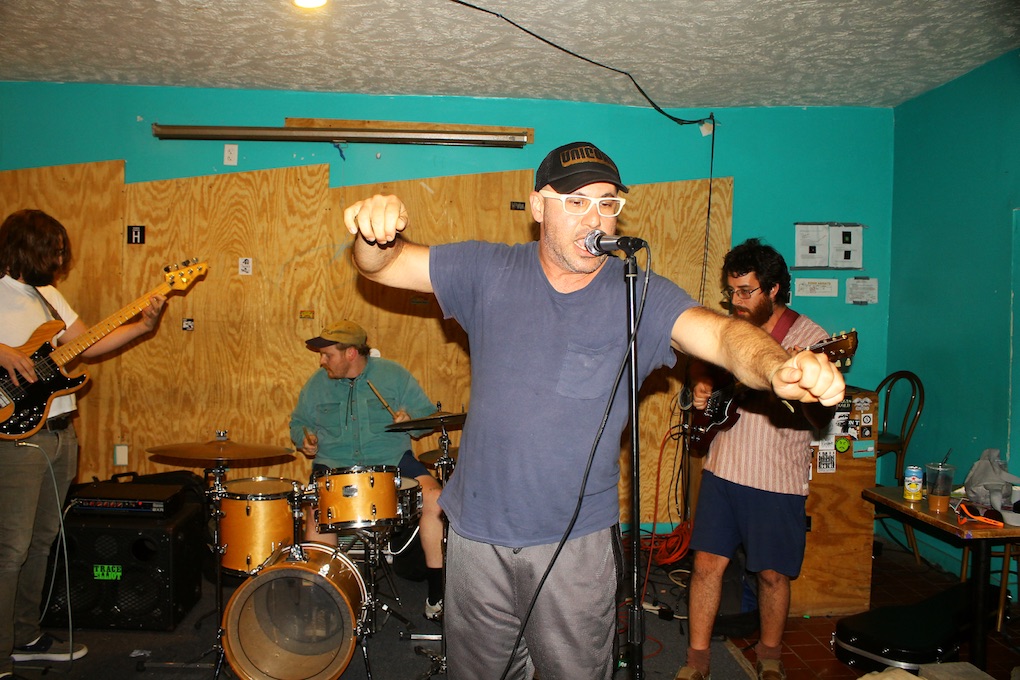It starts, appropriately, by rolling on the seams of piano keys.
“There is something/ got ahold of me/ and it won’t let go,” the singer coos, among a forest trail of piano and upright bass that leads to a clearing of strings. The whole thing then expands orchestrally, with the thrust of the musical diaphragm pushing its chin up and chest out, and, from there, it flowers and flourishes with grandiose sentiment.
The song is “Got Ahold of Me,” the first single and, not incidentally, album opener to Rachel Grimes’ The Way Forth, an opus of a folk opera out via Temporary Residence on multiple formats Nov. 1. Grimes and Temporary Residence have been leaking methodic previews of the new record online in recent weeks.
“Got Ahold of Me” is also the most traditionally emotive thing Grimes, a Kentucky-bred and Kentucky-trained composer, has performed since her former band, Rachel’s, recorded “Last Things Last,” a Jason Noble piece, some 16 years ago. It is a direct shot across the bough for listeners curious about what to expect from her latest work.
“There’s no single message,” said Grimes, who feels the 17-track recording addresses larger themes of who writes history and how it is remembered. “What really I was trying to do from many points of view and many points in time is just listen to voices.”
Pieces like “Patsy” fall into this modus operandi, a spoken-word rumination from an 85-year-old Kentucky woman who is the parent, grandparent and great-grandparent of 103 offspring; the recitation is set to highly effecting, Romantic chamber music. The text, which is nonfiction, was captured when the woman walked into the Winchester Democrat newspaper office on her “last birthday” to document the ups and downs of her life. (“Red House School” achieves a similar sense of scale while remaining charmingly casual, even off-handed.)
“This is a glimpse into a woman’s life at this point in time,” Grimes said. “[The goal] is to hear how people used the language, to hear about how big events were talked about.”
“Other times, the music serves as a vehicle, not a foil,” she added. “What I’m happy to allow is the music to get [you] to listen to the words. It’s not an interpretation of the words. And the setting is memory – that’s the emotional journey for me.”
Rachel Grimes is at ease engaging in conversation; she’s the type of creative conduit who is equally comfortable analyzing her work as she is talking about the weather, or your kids, or life in the rural hills north of Louisville, where she and her husband live.
But Grimes is no push-over. She’s quick to battle – in careful or measured words, mind you – the structures of patriarchy, and much of The Way Forth, indeed, is consumed, quite wonderfully, by women’s voices, women’s stories, and women’s fight for equality in the United States. The music, however, often does less to disassemble the predominant narrative of “taming” the Americas passed down by, gender stressed, “our Founding Fathers.”
“I think The Way Forth can prove to be a lot of things to a lot of people, but I think a lot will see the road is a curvy path,” Grimes said.
To that end, Grimes has created possibly the most eclectic-sounding record of her career. There are waltzes and chorale singing, not to mention music that most Northerners will view as rural-folk or, appropriately, the more traditional music of the Kentucky countryside. As time moves forward, there even is a hint of ragtime.
In that regard, it is a grand view of the country’s westward expansion and the nuances of frontier life, as opposed to, say, a snapshot of moments in time, like Grimes’ more literal work on Rachel’s Music for Egon Schiele.
“[On Music for Egon Schiele,] I was really going for it, mimicking the waltzes of the day, getting at the art and music scene, the underground, these intimate moments between lovers,” she said. “They’re very pictorial and programmatic.”
There are moments of history on the new LP, though. One composition, “End of Dominion,” starts with a sound-clip of American chest-thumping darting directly into jingoism. It then unfurls the story of a 1775 expedition funded by North Carolina investors that seeks, alongside Daniel Boone, to purchase Cherokee land and create the U.S.’ 14th colony. (We’re talking 20 million acres here, the “Transylvania purchase.”)
The music on the track is largely unobtrusive but nonetheless dramatic, even somber at times, a modern glance back at the true founding roots of the west. But, then, a slave named “Dolly,” who bears the first child in the Transylvania purchase, is mentioned, and Grimes introduces a gothic choir chanting words like “servitude.” It’s bold stuff.
“I don’t have a finalizing statement or position – I am not a historical authority about the things I’m writing about,” Grimes said. “What I’m just hoping to do is to jostle things.”
The Way Forth closes with “A New Land,” which Grimes previewed recently as an etude, pun intended, called “Eights.” The piece references some of the piano trills of the record’s opening but feels as if the listener has come out the other end of history with fresh eyes. That’s by design, Grimes said.
“It feels to me to be right now; it’s a recent piece I’ve written,” she said. “The ending has a contemporary feel to it. It’s a zig-zag journey. And you’re taken back to now.”
“’How do you keep going further is a question we always ask ourselves,” she added. “It’s an old-timey way of saying ‘moving ahead.’ It’s the way forward, the way forth.” – Justin Vellucci, MusicTAP, Oct. 7, 2019
-30-



